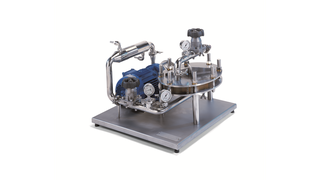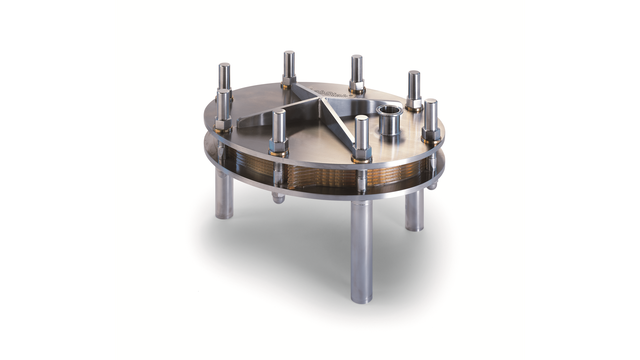LabStak M37/38
The Alfa Laval LabStak® M37/38 is a flexible plate-and-frame test unit for ultrafiltration and microfiltration membrane processes. The unit utilizes support plates and flat sheet membranes of the same size as our full-scale membrane filtration modules. This makes the Alfa Laval LabStak® M37/38 a popular choice for process development, up-scaling, membrane testing, quality assurance and small-scale production. Optional plate sets are available for feeds of different viscosity / solids content
Handy and flexible
The Alfa Laval LabStak® M37/38 is designed to provide quick and precise evaluations in laboratories and other test facilities, while keeping equipment and set-up cost to a minimum.
This flexible unit, which is designed for plate-and-frame operation, can be fitted with the full range of flat sheet membranes available from Alfa Laval for ultrafiltration and microfiltration.
Option
For the LabStak® M37/38 Alfa Laval offers alternative plate set configurations which can be selected according to use.
- M37 plate set
For highly viscous liquids - M38H plate set
High channel, for medium viscous liquids - M38L plate set
Low channel, for low viscous liquids
Alfa Laval LabUnit M37/38
 The Alfa Laval LabUnit M37/38 is a fully integrated system comprising an Alfa Laval LabStak® M37/38 unit complete with necessary pump, valve, heat exchanger and instrumentation.
The Alfa Laval LabUnit M37/38 is a fully integrated system comprising an Alfa Laval LabStak® M37/38 unit complete with necessary pump, valve, heat exchanger and instrumentation.
Benefits
- flexible membrane areas from 0.11 m² to 1.05 m²
- simultaneous testing of up to seven different membrane types
- quick and easy exchange of membranes
- high operating temperature (up to 80°C)
- can be coupled to the by-pass stream of an industrial plant
- different channel height options to optimize flow and pressure
- low internal volume
- flexible system design
- flow pattern similar to that of larger modules
- all components in compliance with FDA regulations, allowing use within food and pharmaceutical processing applications
Fonctionnement
The plate-and-frame module from Alfa Laval is designed with open channels across the membrane surface. The feed stream/retentate flows through these.
The membrane itself is supported by hollow plates with numerous slots that allow the permeate to collect and be removed from the module via the permeate collecting tubes.
Plate-and-frame modules use the membrane itself, aided by lock rings or strips, to seal off the feed/retentate from mixing into the permeate channels. This also prevents any leaks from the plate stack itself.

